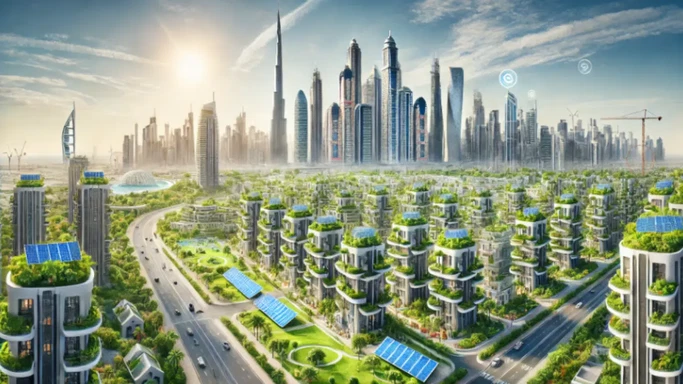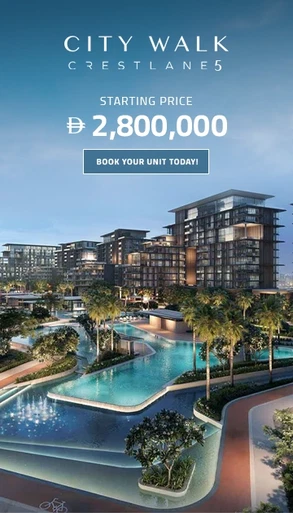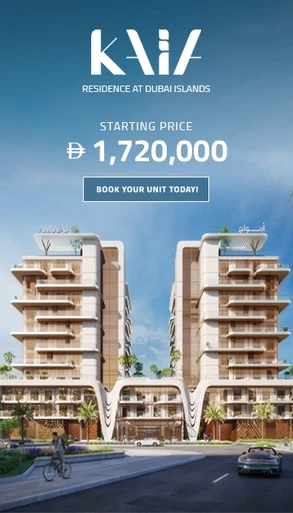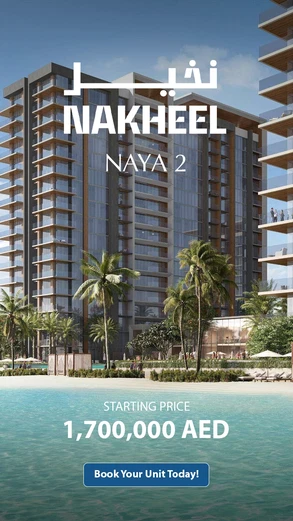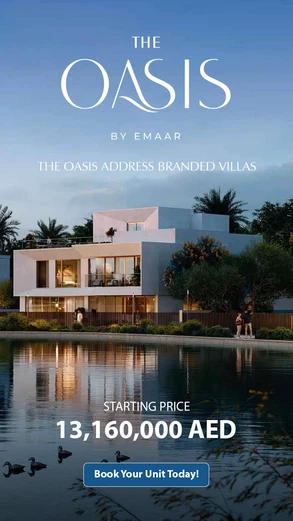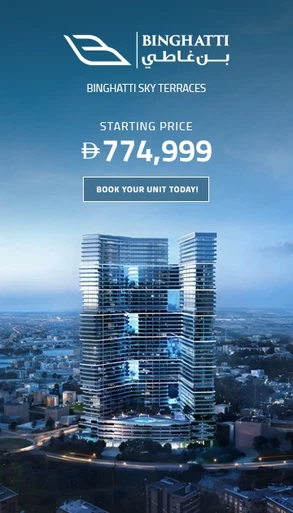Dubai, the city that has become famous for its rapid urban growth and mind-blowing architecture, is now increasingly pursuing sustainability and eco-innovation within its real estate. With growing global environmental awareness, the Emirates understands the importance of sustainable practices in achieving environmental balance and economic sustainability in the long run.
This transformation itself is a response to global environmental challenges and corresponds with the UAE’s strategic vision for achieving a sustainable future. Dubai is now one of their leaders, with real estate developers at the frontlines of this shift towards green building designs, energy-efficient technologies, and sustainable urban planning for reduced environmental footprints and enhanced quality of life for residents.
The Need for Development of Sustainable Real Estate in Dubai
Buildings have a major impact on the environment related to their impact on energy use and emissions of greenhouse gases throughout their life cycle. The same applies more so in Dubai's harsh desert climate, where energy requirements for heat and desalination can be extreme.
This reality highlights the critical importance of sustainable real estate development with a focus on energy efficiency, water conservation, and the use of eco-friendly materials.
By implementing such practices, developers can lessen environmental harm, adhere to changing regulations, and satisfy the increasing market demand for sustainable properties.
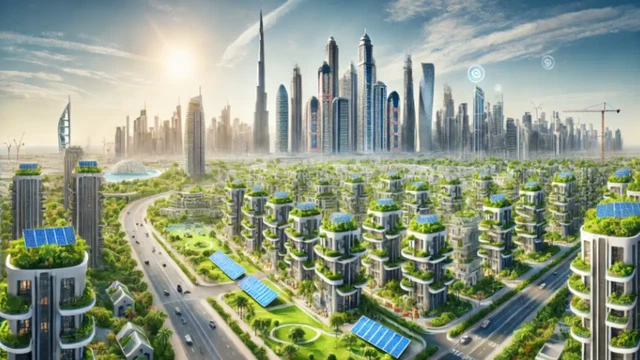
Strategies to Adopt Sustainability and Ecological Innovation
1. Green Building Certifications
Such recognized green building certifications help developers adhere to global sustainability standards. Some prominent certifications are:
- LEED (Leadership in Energy and Environmental Design): An international rating system for green buildings that evaluates energy efficiency, water use, and material sustainability.
- Dubai Green Building Regulations and Specifications: The DGBR obliges new specific long of Dubai to a wide of practices to enhance environment in the amount terms.
- BREEAM (Building Research Establishment Environmental Assessment Method): Popular in Europe and the Middle East for sustainability benchmarking.
Key Facts
- There are more than 400 LEED-certified buildings in Dubai as of 2024, with estimates exceeding 500 by 2025.
- Developers are required to emphasize sustainability as the UAE
2. Energy-Efficient Design and Renewable Energy Integration
Incorporating renewable energy sources and energy-efficient designs is essential in minimizing carbon emissions and operating costs.
Effective Strategies
- Maximal Use of Natural Lighting: Strategic window placement and energy-efficient glass help minimize the use of electric lighting.
- Insulation & Ventilation: Better insulation and intelligent HVAC systems increase energy savings.
- Solar Power: Dubai enjoys plenty of sunshine, so solar panels are incredibly useful.
Key Facts
- It underlines Dubai’s ongoing goal to develop 5,000 MW of clean energy at the Mohammed bin Rashid Al Maktoum Solar Park by 2030.
- Operational costs can be saved by over 30% through the creation of energy-efficient buildings.
3. Water Conservation Measures
Dubai is one of many regions that grapple with water scarcity, and sustainable water management is crucial in these areas.
Best Practices
- Low-Flow Fixtures: Engendering wastewater in residential and commercial buildings.
- Greywater Recycling: Treating wastewater for use in irrigation and cooling systems
- Sustainable Landscaping: Minimize water consumption with drought-resistant plants.
Key Facts
- A community like The Sustainable City in Dubai, which uses efficient irrigation and recycles greywater, has reduced water usage by 50%.
- Water consumption is expected to decrease by 30% with the Water Demand Management Strategy 2030.
4. Sustainable Building Material
Green Materials (reduce environmental impact + better durability)
Sustainable Options
- Recycled Steel: Reduces carbon emissions by 75% versus new steel.
- Bamboo & Reclaimed Wood: Fast-growing and sustainable alternatives to traditional timber.
- Locally-Sourced Materials: Lower the carbon footprint from transport.
Key Facts
- Using green materials in buildings can reduce embodied carbon by as much as 50%.
- Under Dubai's Green Building Regulations, the use of sustainable materials in construction is required.
5. Smart Building Technologies
Smart technologies increase efficiency by reducing energy and water consumption.
Common Technologies
- Disciplines: Automatic climate and lighting control, and BMS
- Implementing IoT Sensors: We can use IoT sensors to identify occupancy and reduce resource usage accordingly.
- AI & Predictive Analytics: Enhances energy consumption behaviours.
Key Facts
- Dubai has seen more than 40% of new properties adopt smart technologies, a figure set to increase to 60% by 2025.
- Smart buildings can save energy by as much as 25%
6. Waste Reduction and Recycling
It is important for sustainability to minimize waste during the construction and operation phases.
Waste Reduction Strategies
- Sustainability depends on minimizing waste during the building and operation stages.
- Recycling Construction Waste: Reducing landfill impact.
- Prefabricated Materials: Reducing waste and energy consumption on site.
- Community Recycling Systems: Teaching the separation of waste.
Key Facts
- Zero waste to landfill has been achieved at the Sustainable City in Dubai due to sophisticated recycling programs.
- The Integrated Waste Management Strategy for Dubai 2041 aims for 80% diversion of waste from landfills.
7. Urban Green Spaces
Incorporating greener spaces in urban developments enhances the quality of air and livability.
Types of Green Spaces
- Green Roofs & Walls: Improves insulation and diversity of life.
- Park & Recreational Facilities: Promoting community wellbeing
- Vertical Gardens: Also known as living walls, vertical gardens can help mitigate the urban heat island effect.
Key Facts
- Dubai has pledged to increase its green cover by 25% by 2030.
- Green spaces can reduce urban temperature by 4°C.
8. Community Engagement and Education
Sustainability awareness creates long-term environmental responsibility.
Engagement Strategies
- Workshops & Seminars: Teaching eco-friendly living habits.
- Green Living Prompts: Giving incentives for sustainable habits.
- Public Awareness Campaigns: Encouraging environmentally-friendly behaviour.
Key Facts
- Community involvement is fundamental to the Dubai Clean Energy Strategy 2050, which aims to make up to 75% of the energy consumption in Dubai sustainable.
- Household energy use can be reduced up to 15% by means of green education.
9. Initiatives to Reduce Carbon Footprint
Cutting carbon emissions is one of the most important steps we can take to fight climate change.
Key Initiatives
- EV Infrastructure: Infrastructures of Electric Vehicle Charging
- Low-Carbon Transportation: Making public transport and biking cost-effective.
- Carbon Offsetting Programs: Supporting reforestation and renewable energy.
Key Facts
- Reducing carbon emissions by 30% across Dubai by 2030.
- The UAE has pledged to reach net-zero emissions by 2050.
10. Government Policies And Incentives
The sustainability initiatives driven by governments that actually foster green development.
Major Policies
- UAE Green Agenda 2030: A national framework for environmental sustainability.
- Sector Transition: Dubai Clean Energy Strategy 2050
- Financial Incentives: incentives to promote green projects: rebates, tax reductions.
Key Facts
- Green Building Regulations in Dubai require all new buildings to follow.
- UAE has invested $160 billion in clean energy projects.
With the use of these sustainability strategies, developers and businesses can work towards creating a more eco-friendly, green declaration.
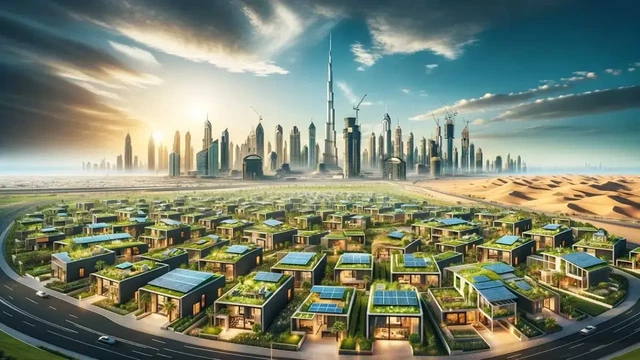
Leading Developers Behind Green Projects in Dubai
Dubai has been a frontrunner when it comes to sustainability, with several property developers paving the way. Here’s a look at some of the key players shaping Dubai’s green future.
1. Emaar Properties
One of Dubai's leading and largest developers, Emaar is committed to sustainability, integrating this into all its buildings and also developing a number of green communities in Dubai. The company incorporates energy-efficient technologies in its building designs and has worked on a variety of environmental initiatives.
Sustainable Projects
- Downtown Dubai and Dubai Hills Estate
- Environment-friendly building materials, solar panels, and water recycling systems.
2. Dubai Properties
Sustainable development practices have been embraced by Dubai Properties to enhance the quality of life while minimizing the impact on the environment. They are known for creating master-planned communities that utilize energy-efficient technology and have green space.
Sustainable Projects
- Jumeirah Beach Residence (JBR) and Business Bay.
- Solar energy, smart irrigation systems, and energy-saving lighting.
3. Meraas
Meraas has been at the forefront of sustainable urban development and has made significant strides in developing environmentally friendly projects throughout Dubai. Their approach focuses on promoting shared living and reducing carbon footprints through walkable, energy-friendly landscapes.
Sustainable Projects
- City Walk and Bluewaters Island.
- LEED-certified buildings, green rooftops, and renewable energy sources.
4. Damac Properties
Damac Properties has since begun to implement sustainable processes across many of its developments. The developer is promoting the use of eco-friendly transport systems in its neighborhoods and putting greater emphasis on reducing energy consumption and water waste.
Sustainable Projects
- Akoya Oxygen and Damac Hills.
- Main Features: High-efficiency appliances, green material, and solar illumination.
5. Sobha Realty
In addition to robust sustainability that includes the first integration of green features in luxury real estate in the UAE, a recent acquisition of a major PV solar farm in Australia will further expand Sobha Realty's new signature. The developer aims to minimize construction pollution and focuses on energy-efficient buildings as part of a holistic approach to sustainable development.
Sustainable Projects
- Sobha Hartland.
- Low-energy design, sustainable materials, solar active systems, and smart home technology.
Notable Sustainable Real Estate Developments in Dubai
Through landmark sustainable development projects in Dubai, the emirate is now a global leader in sustainable real estate. Below are some notable sustainable real estate projects in Dubai:
1. The Sustainable City
Dubai's first net-zero energy community, The Sustainable City, is a development by Diamond Developers.
- Solar-Powered Homes: Community of 500 Solar-Powered Villas
- Urban Farming: 11 natural “biodome” greenhouses and personal garden farms will foster proximity to food.
- Car Free Zones: Promotes the use of electric buggies and cycles, helping to alleviate carbon footprints.
- Waste Management: Extensive recycling initiatives remove a huge percentage of waste from landfills.
2. Al Barari
One of Dubai’s greenest communities, Al Barari is known for its verdant landscapes and environmentally friendly living initiatives.
- 60% of Green Spaces: More than half of the community is set aside for gardens, lakes, and natural reserves.
- Sustainable Landscaping: Irrigates its green spaces in the dry summer months using recycled water and organic compost.
- Energy-Efficient Villas: Properties come with smart cooling systems and solar panels to minimize energy use.
- Farm-to-Table Concept: With its on-site restaurant called The Farm, the community encourages organic farming and sustainable dining.
3. DAMAC Hills 2
Formerly Akoya Oxygen, DAMAC Hills 2 is an environmentally friendly community that aims to help residents live green.
- Sustainable Villas and Apartments: Villas and apartments are built keeping smart home technology in mind to reduce energy consumption.
- Water Conservation: Landscaping with native plants and recycled water systems.
- Green Open Spaces: Themed parks, an organic food market, and cycling tracks that promote an active, sustainable lifestyle.
- Air Quality Initiatives: incorporates air purification technologies and green roofs for environmental health.
4. Dubai South
Dubai South is an emerging smart city. Dubai South was designed from the outset to prioritize sustainability, smart technology, and ethical development.
- Green Building Standards: All developments comply with Dubai’s Green Building Regulations.
- Smart Transport Systems: Electric buses, shared mobility solutions, smart traffic management.
- Combining Renewable Energy: Buildings have solar panels, and cooling systems have high energy efficiency.
- Waste Management Programs: Robust recycling and composting programs divert waste from disposal.
5. Ghaf Woods
Ghaf Woods by Majid Al Futtaim, Dubai’s first forest community, says it offers a nature-centric lifestyle with sustainability threaded through its very core.
- 10,000+ Native Ghaf Trees: Provides biodiversity and natural cooling for the community.
- Carbon-Neutral Living: Homes are built with little environmental impact and are supported by energy-efficient architecture.
- Green Mobility: Footpaths and cycling lanes eliminate car dependency
- Innovative Water Use: Employs smart irrigation systems and graywater recycling.
These plans are seen as a testament to Dubai’s commitment to bringing sustainability into its urban development, creating a global model for green property development.
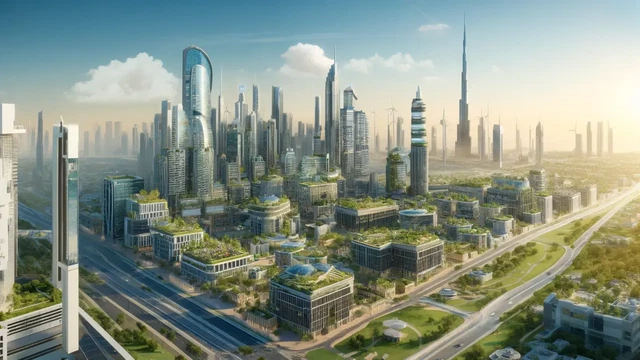
The Financial Performance of Sustainable Real Estate in Dubai
- Increased Market Value: Due to the increasing demand from eco-friendly investors and tenants, sustainable properties in Dubai tend to demand better resale and rental prices.
- Decreased Operational Cost: The use of energy in such smart buildings is charged by utilizing renewable energy and smart technologies, and hence, utility bills can also be lowered.
- Lucrative Regulatory Incentives: The Dubai government offers favourable taxation and licensing rates for green developments, which enable business models to promote sustainability.
- Environmental Consideration: International investors are becoming more and more eco-friendly, which makes sustainable developments more attractive to long-term investment.
- Corporate Demand: Corporate entities that require energy-efficient office spaces for their ESG compliance also fuel the demand for green real estate in Dubai.
- Increased Occupancy: Energy-efficient homes and commercial properties experience higher occupancy rates as tenants are open to paying higher rates for energy savings and healthier living environments.
- Resilient to Market Changes: Green-certified properties tend to be less exposed to market downturns owing to their inherent appeal and cost efficacy.
Dubai’s Green Developments: Economic and Environmental Impacts
- Energy Independence: Green projects diminish dependence on fossil fuels, thus backing Dubai’s movement toward renewable energy sources.
- Introduction of Jobs: The sustainability industry supports job growth in renewable energy, green building, and environmental consulting.
- Reduction of Carbon Footprint: With the inclusion of sustainable practices, these developments help the Emirate in its mission to achieve net-zero emissions by 2050.
- Healthier Community: Improved air quality, more trees, green spaces, energy-efficient homes, and sustainable urban living will contribute to the overall well-being of the residents and cut healthcare costs.
- Global Competitiveness: With sustainability now a focus worldwide, Dubai's eco-innovative real estate sector makes it better positioned as a leader in sustainable urban planning.
- Increased Tourism Appeal: Green buildings and eco-friendly developments tend to attract more environmentally conscious tourists, leading to diversified economic growth.
Dubai: On the Road to Becoming a World Sustainability Leader
Dubai's drive for sustainability is more than individual developments. The Vision 2040 Urban Master Plan, which focuses on sustainable urban growth, smart infrastructure, and environmental sustainability, is aligned with the emirate’s roadmap.
Dubai is emerging as a global frontrunner in sustainable urban planning and green technology integration through strategies such as the Dubai Clean Energy Strategy 2050 and the UAE Net Zero by 2050 strategic initiative. Dubai is leading the real estate and environmental conservation by encouraging collaboration between the government, the private sector, and residents.
Closing In
In the increasingly complex landscape of Dubai, a sustainable real estate development option is a must. With eco-innovation and sustainable practices, developers can support the emirate’s vision of a greener, more resilient future. Green building certifications, energy-saving designs, smart technologies, and water-saving measures are a few of the strategies available to advance sustainability in real estate.
Further, as demand for green and sustainable properties continues to rise, developers who adhere to these principles will gain not only regulatory benefits but a growing market of environmentally conscious property investors and residents alike.
The journey towards sustainability in real estate is one that must be travelled together, and by taking proactive measures today, Dubai’s developers can pave the way for a more sustainable tomorrow.
Explore More...
